You’ll find exceptional sleep-stress monitoring in seven standout wearables: the Oura Ring 4 with its 18-sensor array tracking HRV and temperature changes, WHOOP 4.0’s recovery metrics with smart alarms, Apple Watch’s HRV foundation with breathing apps, Garmin Fenix 5x’s all-day stress tracking, Fitbit Inspire 3’s affordable sleep stage detection, Fibion Helix’s raw data access for professionals, and Vertu AI Diamond Ring’s luxury AI-powered analytics. Each device offers unique advantages for understanding how your stress directly impacts sleep quality and recovery patterns.
Oura Ring 4: Advanced Biometric Analysis for Sleep-Stress Correlation
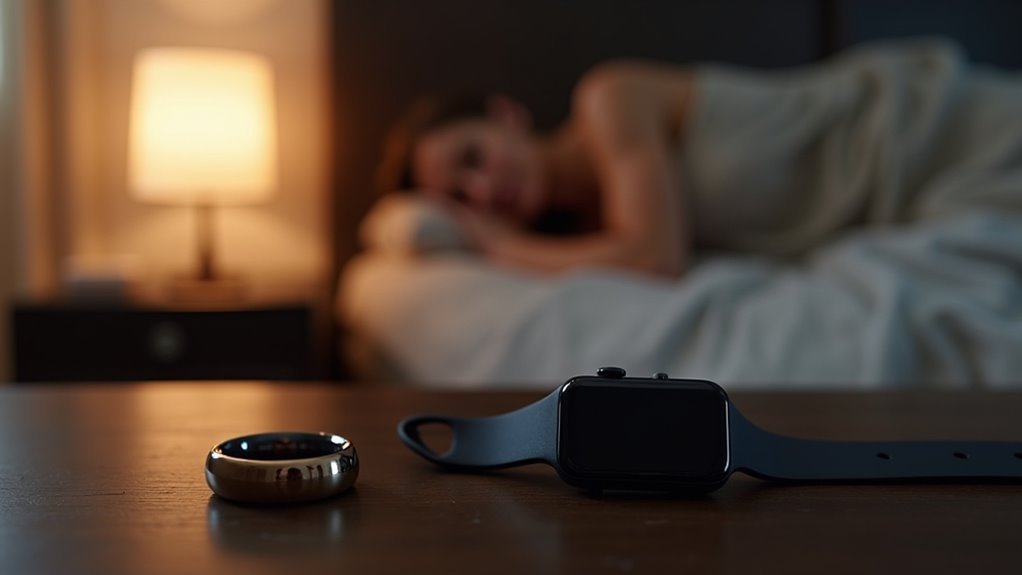
Sleep disruption often signals deeper health issues that traditional fitness trackers miss entirely. The Oura Ring 4’s redesigned multi-sensor system captures these subtle connections through 18-path photoplethysmography technology, measuring blood oxygen, heart rate, and heart rate variability simultaneously.
You’ll receive detailed sleep analysis covering REM, deep sleep, and restfulness while the device continuously monitors your stress through HRV fluctuations and skin temperature changes.
The ring’s Smart Sensing technology optimizes signal quality throughout the night, correlating stress data with sleep metrics to reveal how psychological tension impacts your rest. The device’s recessed sensors eliminate pressure points that could interfere with accurate readings during sleep.
You’ll understand when rising stress disrupts recovery phases and receive personalized recommendations based on combined sleep-stress indicators, empowering proactive health management.
WHOOP 4.0: Comprehensive Recovery Tracking With Smart Alarm Integration
You’ll find WHOOP 4.0’s recovery metrics go beyond basic sleep tracking by analyzing how your body actually recovers overnight through detailed sleep stage monitoring and HRV data.
The device’s smart alarm feature uses this sleep data to wake you during your lightest sleep phase, ensuring you’re not jarred awake from deep sleep.
These recovery insights help you understand whether you’re truly ready for intense training or need additional rest based on your body’s overnight restoration process. The device provides daily recommendations for optimizing your performance based on how well your body has recovered from previous strain and stress levels.
Recovery Metrics Analysis
When you’re serious about optimizing your recovery, WHOOP 4.0’s extensive tracking system delivers the physiological insights you need to make informed decisions about training and rest. The device monitors multiple biomarkers simultaneously, creating a thorough picture of your body’s recovery state.
| Metric | What It Measures | Recovery Impact |
|---|---|---|
| Heart Rate Variability | Nervous system health | Indicates stress levels and readiness |
| Blood Oxygen (SpO2) | Respiratory efficiency | Shows sleep quality and health status |
| Skin Temperature | Physiological changes | Detects stress reactions and illness |
| Respiratory Rate | Breathing patterns | Reveals stress, illness, or poor recovery |
WHOOP’s algorithm processes this data to generate your daily recovery score, helping you understand whether you’re ready for intense training or need additional rest. The Health Monitor displays this information using color-coded alerts when your metrics fall outside your personal baseline range, making it easy to spot potential issues at a glance.
Smart Alarm Features
Beyond tracking your recovery metrics, WHOOP 4.0’s smart alarm system guarantees you wake up at the perfect moment in your sleep cycle. The device uses haptic alerts—gentle vibrations that won’t disturb your partner—to wake you during lighter sleep phases when you’ll feel most refreshed.
You can customize your wake window based on your specific needs, whether that’s a targeted time or ideal sleep duration. The Sleep Coach feature analyzes your sleep stages and provides personalized recommendations for better rest quality.
WHOOP 4.0’s advanced sensors, including five LEDs and four photodiodes, guarantee precise sleep cycle detection. This technology monitors your deep, light, and REM sleep phases, allowing the smart alarm to minimize morning grogginess by timing your wake-up perfectly. The device’s impressive five days battery life means you won’t need to worry about charging interruptions affecting your sleep tracking accuracy.
Apple Watch: Heart Rate Variability Monitoring With Breathing Exercise Features
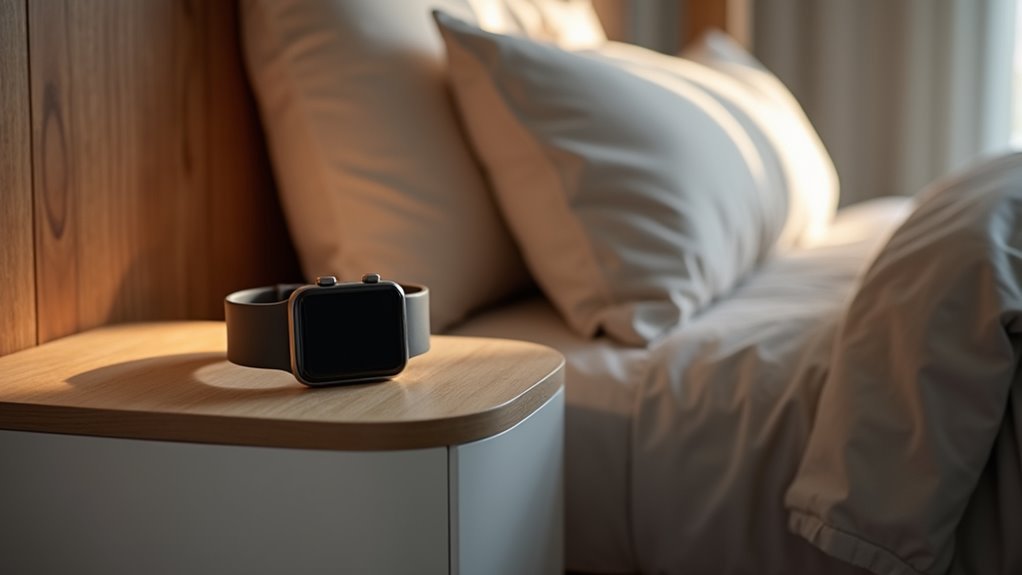
Although the Apple Watch doesn’t include built-in breathing exercises, its heart rate variability (HRV) monitoring capabilities create a powerful foundation for stress management and sleep improvement when paired with third-party applications.
You’ll find that HRV analysis helps assess your stress levels and recovery while providing personalized recommendations for better well-being. Third-party apps like Stress Monitor leverage your Apple Watch’s heart rate data to track stress patterns and offer guided breathing sessions.
The ECG sensor shows potential for future stress prediction tools, while current apps integrate breathing exercises that complement HRV monitoring. You can monitor your resting heart rate alongside breathing rate tracking, creating thorough insights into factors affecting your sleep quality and emotional state. The Apple Watch also provides sleep trends analysis over the past 14 days to help identify patterns that affect your rest quality.
Garmin Fenix 5x: Multi-Sport Performance With Stress Recovery Metrics
The Garmin Fenix 5x takes an extensive approach to sleep optimization by combining multi-sport performance tracking with advanced stress recovery metrics that work together to paint a complete picture of your overall wellness.
| Feature | Capability | Integration |
|---|---|---|
| Sleep Detection | Automatic identification | Garmin Connect App |
| Stress Monitoring | All-day HRV tracking | Real-time insights |
| Multi-Sport Tracking | Running, cycling, swimming | Strava compatibility |
| Recovery Metrics | Performance-based insights | ANT+ sensors |
| Activity Analysis | Steps, calories, intensity | MyFitnessPal syncing |
You’ll benefit from continuous stress level monitoring that uses heart-rate variability to assess your body’s recovery needs. The device automatically detects sleep periods and provides statistics on total sleep hours, though deep sleep analysis has reported accuracy issues. Its multi-sport capabilities track various activities while offering race predictions and strength training insights. The device features Do Not Disturb Mode that turns off notifications and alerts during sleep while keeping alarms active to enhance sleep quality by minimizing disturbances.
Fitbit Inspire 3: Affordable Sleep Stage Detection With Basic Stress Insights
Budget-conscious users will find the Fitbit Inspire 3 delivers solid sleep stage detection capabilities without the premium price tag of more advanced wearables.
You’ll get 86.5%–88% overall sleep accuracy, though light sleep detection ranges from 53.4%–78% and deep sleep accuracy sits between 27.9%–59%. The device requires at least three hours of sleep data to estimate stages effectively.
While you won’t get detailed stress recovery metrics like premium devices offer, you’ll receive basic stress insights through heart rate and activity monitoring. The device performance may vary based on your individual sleep characteristics, as studies indicate that factors like insomnia or specific sleep patterns can introduce bias in measurements.
The sleek design features a user-friendly interface that presents your sleep trends in an accessible format. Some users report tracking issues during nighttime wake-ups, but you’ll find it reliable for monitoring general sleep patterns and staying within budget.
Fibion Helix: Raw Data Access for Professional Sleep-Stress Analysis
When you need clinical-grade sleep and stress data for professional research, Fibion Helix delivers raw sensor access that consumer wearables can’t match.
You’ll get precise heart rate variability measurements through its patented PPI sensor, essential for analyzing stress patterns and autonomic nervous system function.
The device’s 3-axis accelerometer tracks how your physical activity impacts sleep quality and recovery.
You can access detailed sleep stage analysis covering light, deep, and REM phases, plus sleep continuity and efficiency metrics that automatically calculate for streamlined research.
What sets Fibion Helix apart is its API and SDK integration, allowing you to customize data flows for large-scale studies.
The wear detection technology guarantees reliable data collection, while raw data access enables deep analysis that’s impossible with consumer devices designed for basic fitness tracking. The device’s discreet design encourages continuous wear throughout multi-week studies, maintaining data integrity that’s crucial for longitudinal sleep-stress research.
Vertu AI Diamond Ring: Luxury Wearable With AI-Powered Health Correlation
Luxury meets cutting-edge health technology in Vertu’s AI Diamond Ring, a wearable that transforms clinical-grade biometric monitoring into a statement piece you’ll actually want to wear every day.
This double-layered pivoting design combines lab-grown diamonds with sterling silver, delivering 24/7 sensorless heart rate tracking and non-invasive blood glucose detection through high-precision PPG sensors.
You’ll get extensive sleep-stress correlation analytics powered by AI algorithms that connect your biometric data to emotional well-being patterns.
The ring tracks sleep quality, heart rate variability, blood pressure, and SpO2 levels while providing personalized wellness recommendations. Multiple versions are available including the Duo Ring Set for couples and special occasions at $1,560.
With 10-day battery life, 5ATM waterproof rating, and seamless Apple Health integration, you’re getting professional-grade health monitoring disguised as luxury jewelry that’s comfortable enough for continuous wear.
Frequently Asked Questions
How Long Does It Take to See Meaningful Sleep-Stress Correlation Data?
You’ll start seeing initial sleep-stress patterns within days, but you need 8-10 weeks of continuous monitoring to establish meaningful correlations. Weekly data aggregation over multiple months provides the most reliable predictive insights.
Can These Wearables Replace Professional Sleep Studies for Medical Diagnosis?
You can’t rely on wearables to replace professional sleep studies for medical diagnosis. While they’re excellent screening tools, they lack the precision and thorough brain activity monitoring that doctors need for accurate clinical decisions.
Do Subscription Fees Affect Access to Sleep-Stress Correlation Features?
Yes, you’ll find subscription fees greatly impact access to detailed sleep-stress correlation data. You’ll get basic metrics free, but extensive insights require premium subscriptions ranging from $99-$200 annually across most devices.
Which Wearables Work Best for People With Sleep Disorders?
You’ll find Amazon Halo Rise and Oura Ring perform best for sleep disorders, maintaining accuracy when other devices fail. They provide reliable sleep staging and comfortable overnight wear that’s essential for consistent tracking.
How Accurate Are Wearables Compared to Clinical Sleep Monitoring Equipment?
Wearables can’t match clinical polysomnography’s gold-standard accuracy, but you’ll find the Oura Ring performs best among consumer devices, achieving 5% higher accuracy than Apple Watch and superior wake/deep sleep detection sensitivity.

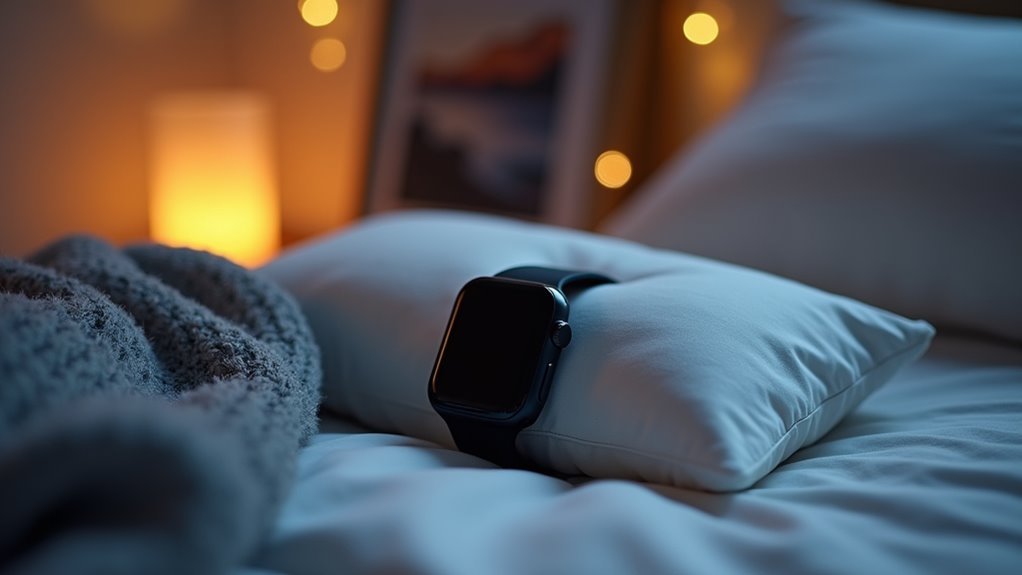
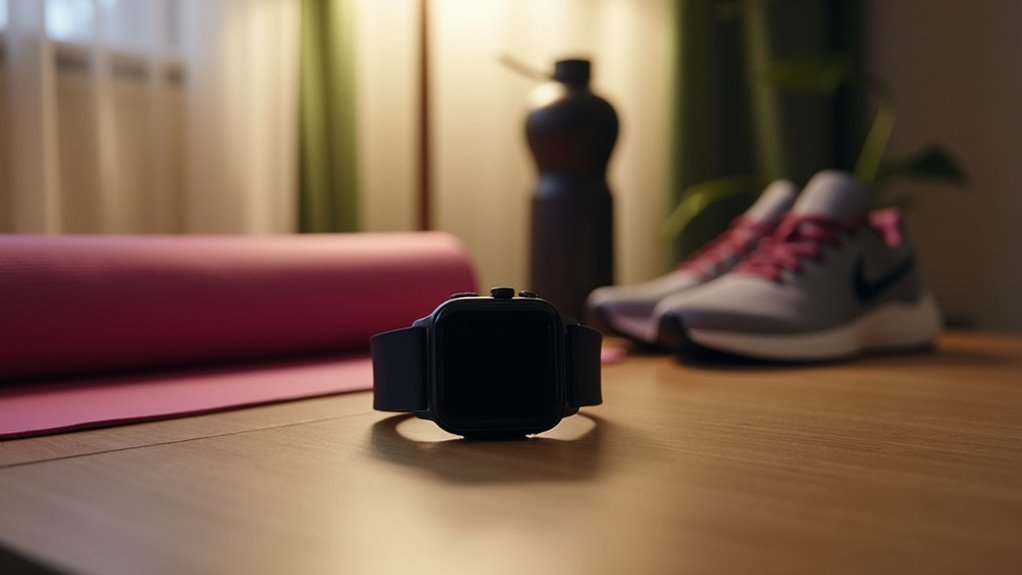
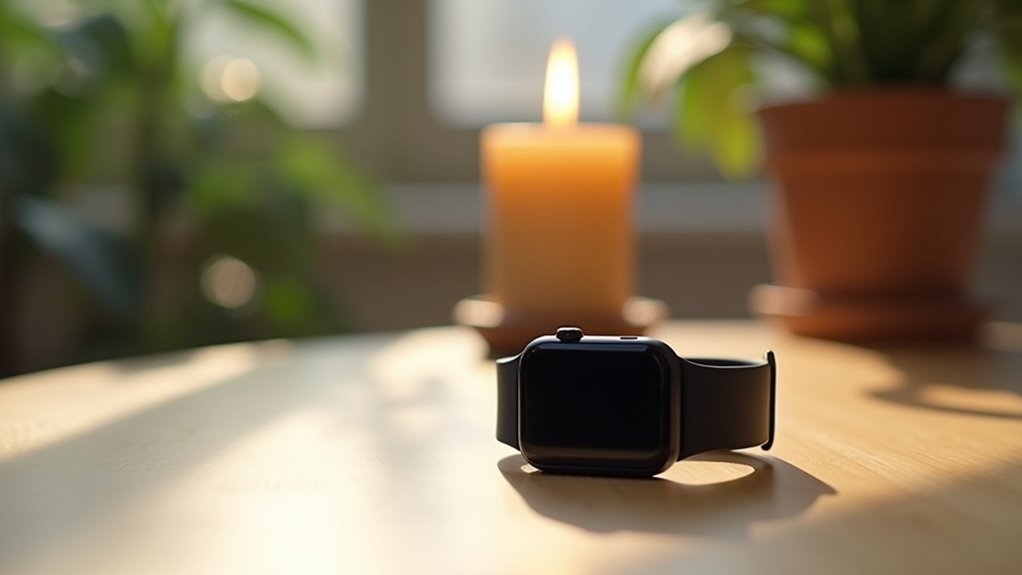
Leave a Reply